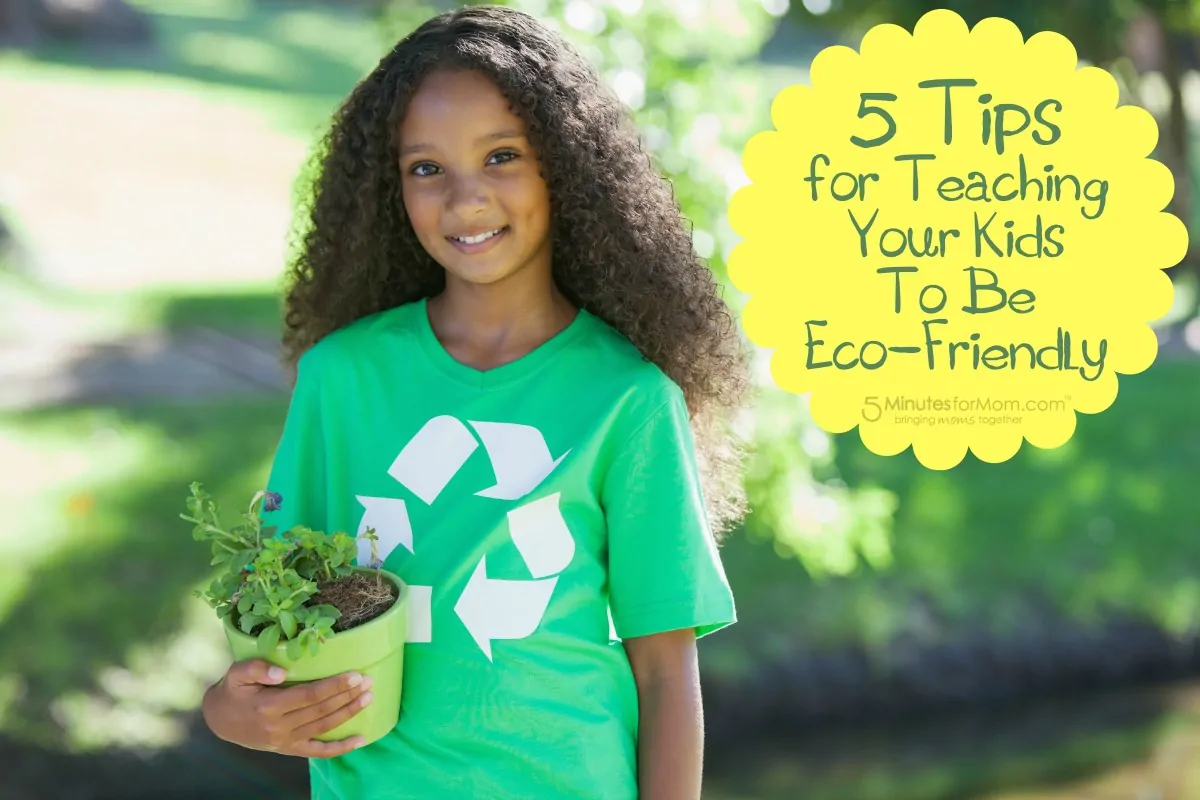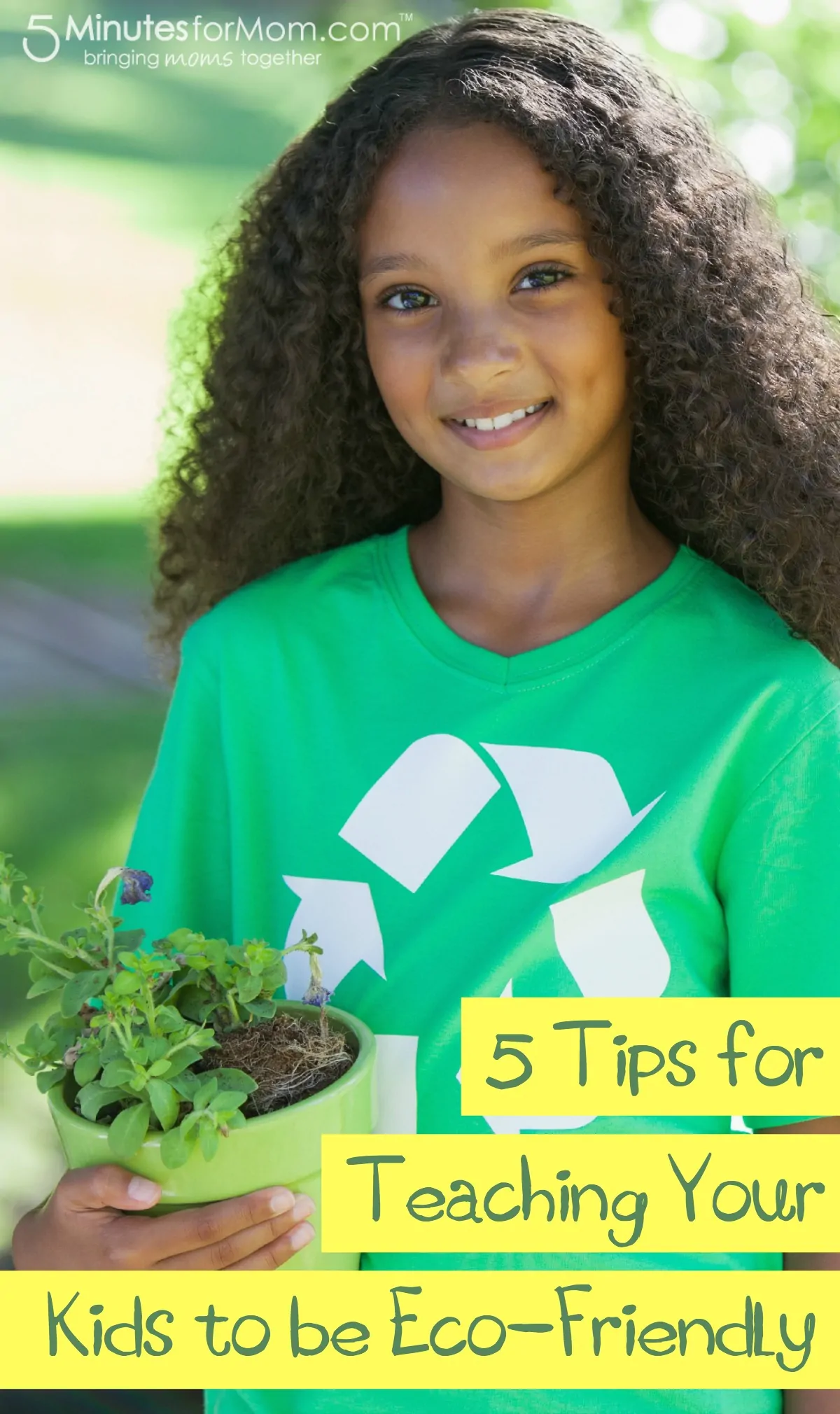This post may contain affiliate links. Read my disclosure policy here.
How can you as a parent help your kids become eco-friendly, caring stewards of the beautiful world they live in?

There are so many stresses on the environment that many scientists believe we are in the midst of one of the largest extinctions that has ever occurred on earth. Add to that the fact that many of our natural resources are finite and it’s clear that instilling a sense of awareness and care for the natural environment is incredibly important for today’s youth.
A generation without concern for the world’s precious ecosystems and natural resources could be the final stressor that pushes the world into a dangerous imbalance that it won’t be able to recover from.
Here are 5 ways you can help your children be more eco-friendly…
Tip 1. Model the behaviors you would like your children to value.
If they see you carelessly toss recyclables into the trash, what do you think they will do?
Tip 2. Set up an easy to use recycling system in your kitchen.
Make it easy for them to comply by having individual bins for cardboard and paper, glass, cans and plastics. The younger you introduce them to this system, the more certain it will become a life-long habit for them.
Tip 3. Let them know early on why you recycle.
Kids understand a lot more than we often give them credit for. Show them a big beautiful tree in the yard and how it provides shelter for so many birds, insects, and animals. Then show them paper, and explain that most paper is made from cut down trees. You will be surprised at the impact this simple lesson will have.
Tip 4. Make connections to their immediate environment to explain the “why” behind what they are doing.
Help make their actions more meaningful to them.
Research now shows that the young generation is very disconnected from the natural world.
Rather than going outside to explore the woods, fish or swim in a pond, or just lie on their backs and watch the clouds, kids are mostly indoors at school, watching TV, playing video games or shopping at the mall.
When they are outdoors, they are usually participating in sports and have little time to watch the world around the ball field. If you don’t introduce them to the wonders of nature, who else will?
This is the only way they can truly have an interest in and feelings of concern for the environment. A trip to the zoo is fine to show them animals from other continents, but what they really need is a sense of connection to their immediate environment.
Tip 5. Get active and involved in nature.
Seek out local, state or national parks that have programs for youth and families.
Definitely introduce them to the wonders found in your own backyard. Set up bird feeders and get your kids a bird identification field guide. Show them how many of the most endearing birds we see in at our feeders and in the trees during the summer migrate as far away as southern hemisphere in the winter.
This helps give them a sense of how the whole world is connected and provides them with a real life example of how what happens there affects what happens here. Eco-friendly kids really do require constant exposure to the natural world, so be their guide.
If you didn’t spend a great amount of time exploring the outdoors in your youth, you will learn plenty from your family excursions too.
Share With Your Friends
We’d love, love, love a tweet or a pin…
[Tweet “5 Tips for Teaching Your Kids To Be Eco-Friendly”]

An earlier version of this post was written by Grace Pamer and published on our sister site, 5 Minutes for Going Green on Feb 21, 2012.










Heather says
Great tips. Where we live (Scotland) we have to recycle everything – including food waste – which I personally think is a good thing.
However, this has been gradually introduced over the past 8 or 9 years, with food waste being the most recent type of waste to be added to the recycling items. So, while I’ve had to learn to do this, it’s second nature to my kids who have grown up with it. There have been count times when I’ve thrown a bit of paper or a banana skin in the waste – either absent-mindedly or accidentally – only for one or both kids to shout ‘that goes in the recycling!’ I think it’s fantastic that they’re growing up with it as the ‘norm’.